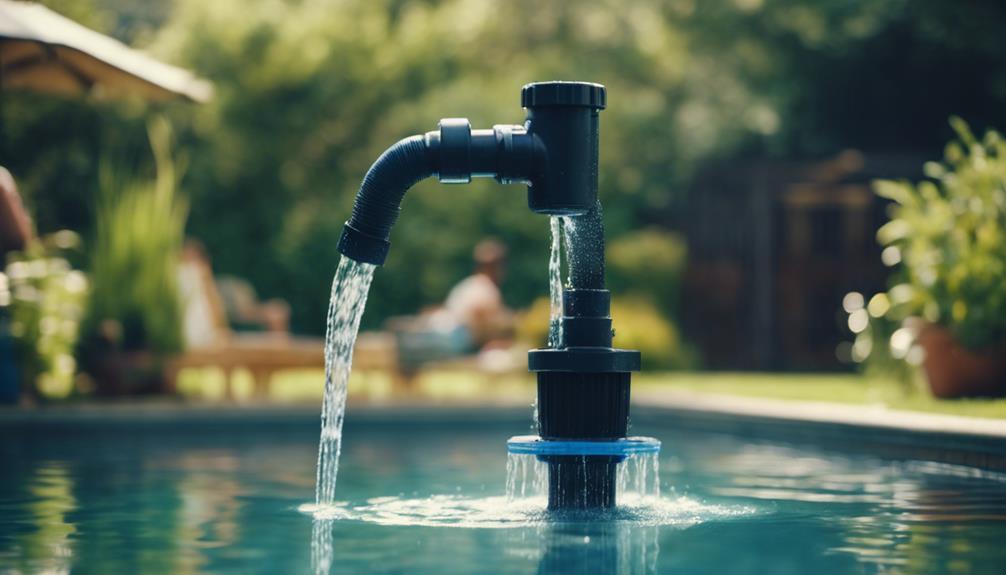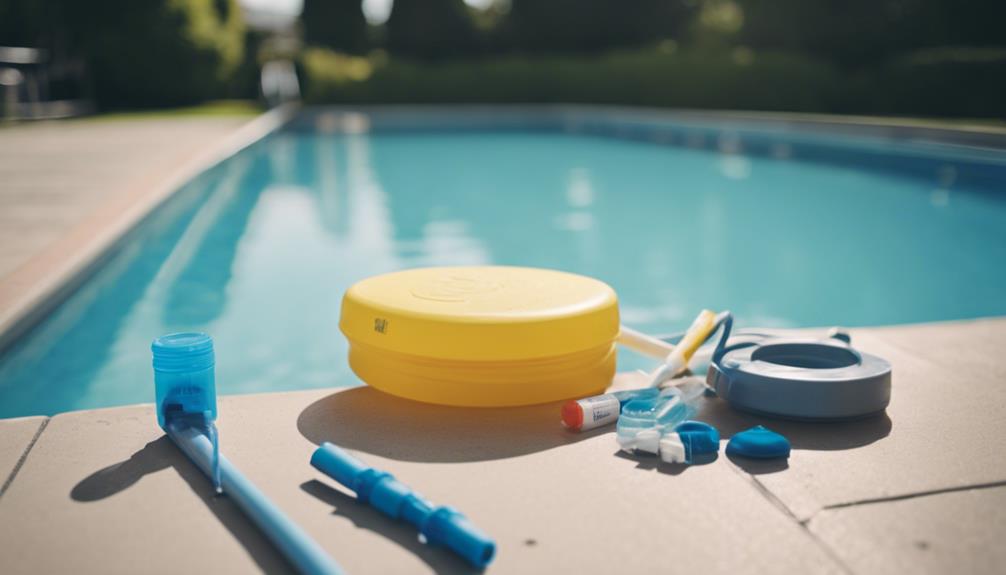To recycle swimming pool water in an environmentally-friendly way, consider incorporating techniques such as ozone treatment for sanitation, UV sterilization, natural filtration through plants and biofilters, reverse osmosis for removing impurities, and advanced oxidation for breaking down contaminants. By efficiently treating pool water, you can support sustainability, conserve resources, and ensure safety through proper filtration. Additionally, utilizing treated water for landscaping can help with water conservation efforts and provide plants with nutrient-rich water. By adhering to these eco-friendly methods, you can significantly decrease water wastage, adhere to sustainable practices, and reduce pressure on local water sources.
Key Takeaways
- Implement natural filtration methods like plants and biofilters.
- Utilize advanced water treatment technologies for sustainability.
- Recycle backwash water to reduce water wastage.
- Consider greywater reuse for eco-friendly practices.
- Conserve resources by minimizing pool water refilling.
Benefits of Reusing Pool Water
By reusing pool water, you can save thousands of gallons annually and contribute to sustainable water management practices. When you recycle pool water, you actively participate in reducing water consumption and conserving valuable resources. Proper filtration methods play an essential role in ensuring the safety of reused pool water. Through effective treatment, the water can be maintained at quality standards suitable for reuse, making it not only eco-friendly but also practical.
Moreover, the environmental impact of reusing pool water is significant. Implementing sustainable practices like water reuse can minimize the strain on local water sources and promote a more eco-conscious approach to pool maintenance. By incorporating these strategies into your pool care routine, you actively contribute to a greener environment and support the conservation of our precious water resources.
Importance of Water Conservation

Water conservation plays a pivotal role in sustainable resource management and environmental stewardship. When it comes to pool maintenance, the environmental impact of water usage can't be overlooked. Traditional pools lose substantial amounts of water through evaporation annually, emphasizing the significance of water conservation within this sphere.
By recycling pool water through advanced filtration and treatment systems, it's possible to minimize water waste and promote sustainable practices. Not only does recycling pool water help in reducing the environmental footprint of pool maintenance, but it also contributes to broader water conservation efforts.
By reusing swimming pool water, you actively participate in conserving this precious resource, lessening the strain on local water supplies. Embracing these practices not only benefits your pool but also aligns with a larger goal of preserving water resources for future generations.
Join the movement towards water conservation by incorporating recycling pool water into your pool maintenance routine to make a positive impact on the environment.
Methods for Treating Pool Water

What are some effective methods for treating pool water to maintain peak water quality? When it comes to pool water treatment, there are various options available to guarantee your swimming pool stays clean and safe for use. Consider utilizing ozonation or UV sterilization systems to effectively eliminate bacteria and contaminants. Natural filtration methods, such as biofilters and plants, can also help in cleaning and reusing pool water. For more advanced purification, explore techniques like reverse osmosis or advanced oxidation to remove impurities and make the water reusable. Additionally, ionization or mineral purification systems offer alternatives to traditional chemical treatments. Technologies like ozone generators and cartridge filters can aid in efficiently recycling and reusing swimming pool water. To help you understand better, here is a table summarizing some common methods for treating pool water:
| Pool Water Treatment | Description |
|---|---|
| Ozonation | Uses ozone to sanitize water |
| UV Sterilization | Kills bacteria with UV light |
| Natural Filtration | Utilizes plants and biofilters |
| Reverse Osmosis | Removes impurities through a membrane |
| Advanced Oxidation | Breaks down contaminants using oxidation |
Reusing Pool Water for Landscaping
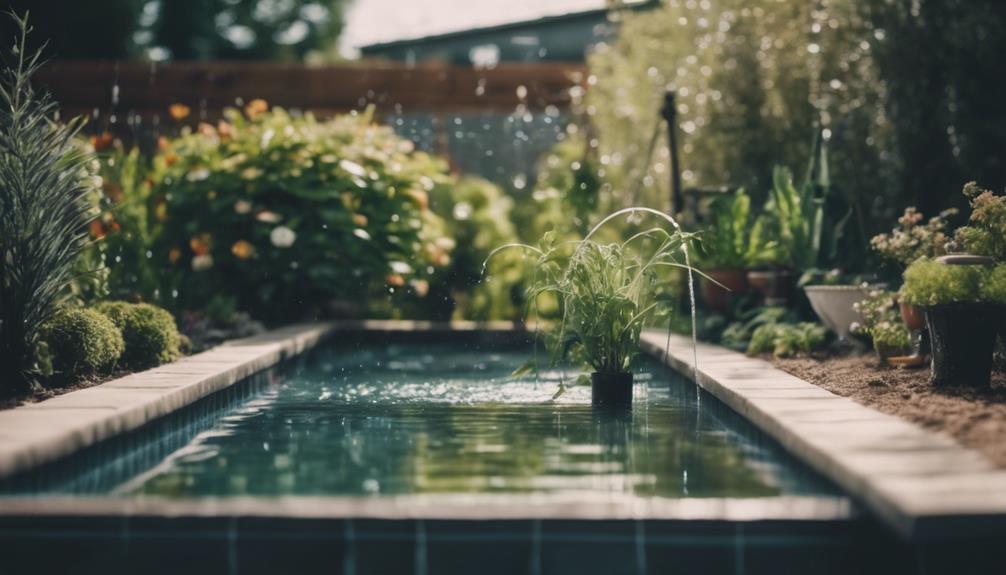
Consider utilizing your treated pool water for landscaping purposes to contribute to water conservation efforts and promote sustainability in your outdoor spaces.
Reusing pool water for landscaping can greatly reduce water waste and benefit your plants. Treated pool water, rich in nutrients, can serve as an excellent irrigation source for your lawns, gardens, and landscaping vegetation.
However, it's important to guarantee proper filtration and treatment of the pool water before using it for landscaping to avoid any harm to the plants or soil.
By incorporating this eco-friendly practice into your routine, you not only conserve water but also support the health and growth of your outdoor greenery.
Make the most of your pool water by repurposing it responsibly for your landscaping needs, thereby contributing to a more sustainable environment for the future.
Reducing Chemical Usage in Pools
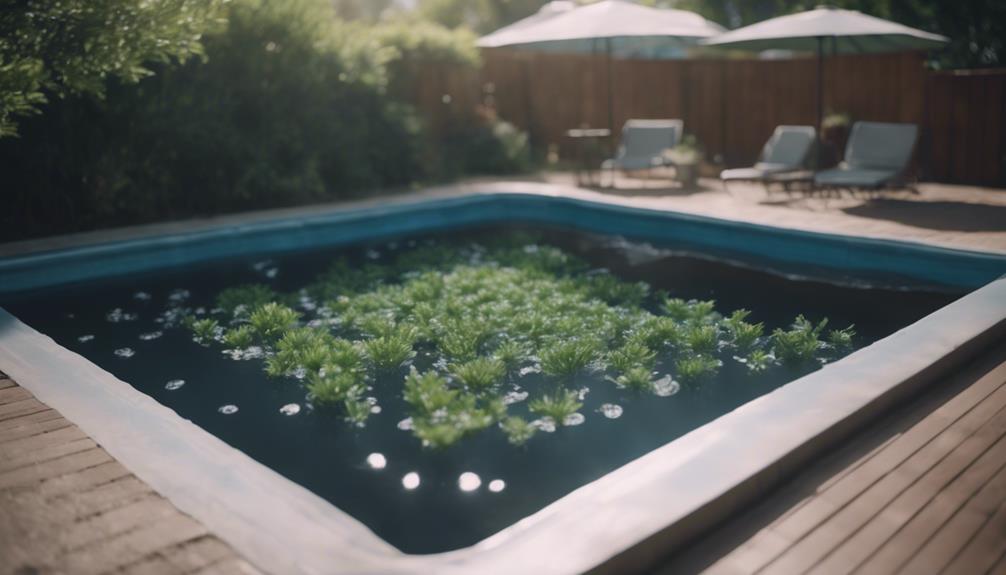
To minimize the use of chemicals in your pool, explore alternative methods such as incorporating UV light systems and employing robotic cleaners. UV light systems offer a natural way to sanitize pool water, reducing the need for harsh chemicals like chlorine. By harnessing the power of UV light, you can effectively reduce the chlorine usage in your pool while maintaining water quality.
Additionally, robotic cleaners can help decrease the reliance on chemical cleaning solutions by efficiently removing debris and algae from your pool. Regularly cleaning pool filters is another effective way to decrease the need for chemicals in water maintenance.
Utilizing Pool Water for Cleaning
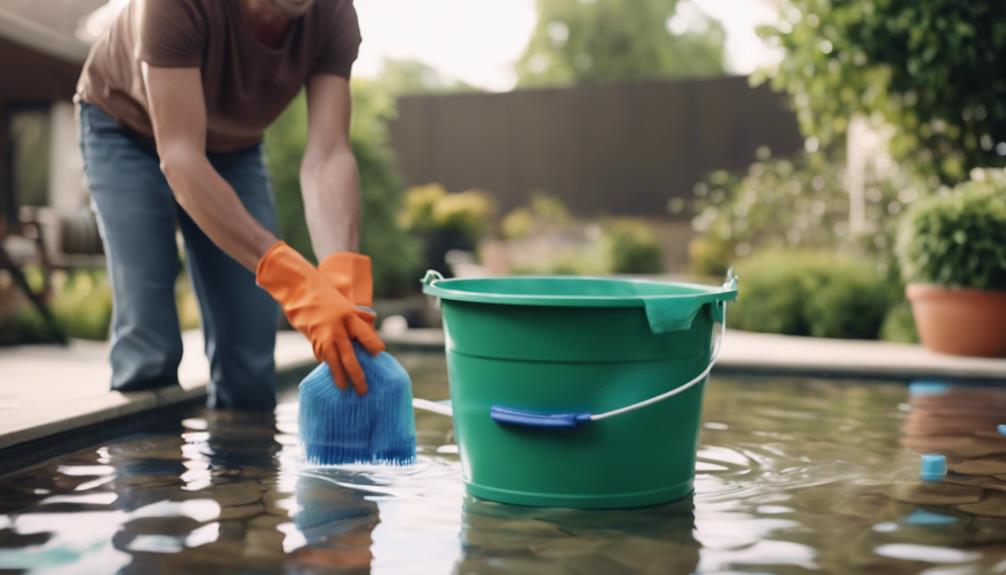
You can repurpose swimming pool water for various cleaning tasks to conserve resources and promote sustainability.
Reusing pool water for cleaning not only helps in water conservation but also reduces the environmental impact of pool maintenance.
Here are some ways you can utilize pool water for cleaning:
- Washing outdoor surfaces: Use pool water to clean patios, decks, or outdoor furniture.
- Watering plants: Give your garden a drink with pool water, as long as it doesn't contain harmful chemicals.
- Cleaning vehicles: Use pool water to wash your car or other vehicles, minimizing freshwater use.
Eco-Friendly Pool Water Disposal
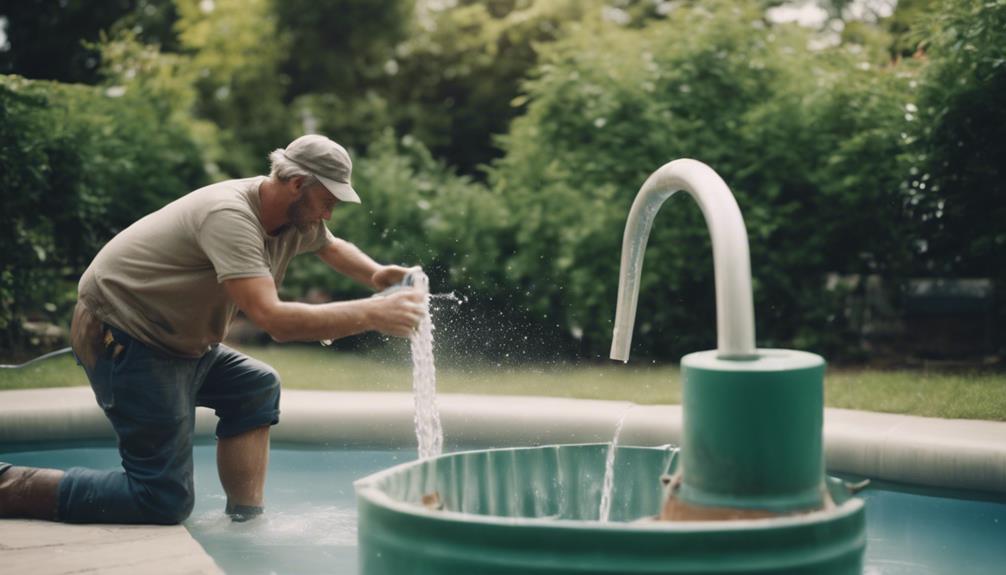
Repurposing swimming pool water for eco-friendly disposal methods can greatly contribute to water conservation efforts and reduce environmental impact.
When it comes to pool water disposal, proper treatment is crucial to guarantee that the water can be reused without harming the environment.
Utilizing treated pool water for irrigation, landscaping, or even non-potable purposes through a greywater system can markedly reduce the strain on municipal water sources.
Additionally, by adhering to local regulations regarding pool water disposal, you can confirm that your actions are in line with environmental guidelines and prevent any potential harm to the ecosystem.
Remember, recycling and reusing swimming pool water not only conserves water but also minimizes waste by finding alternative ways to use this valuable resource.
Promoting Sustainable Pool Practices
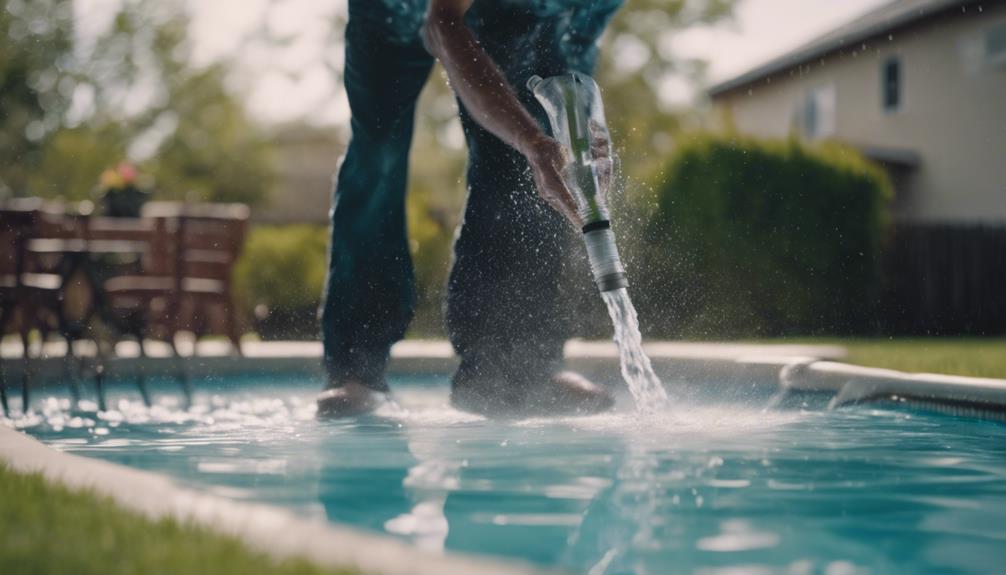
Implementing sustainable practices in pool maintenance can greatly benefit the environment and reduce operational costs. Pool owners can make a substantial impact by adopting eco-friendly pool practices:
- Utilize Pool Covers:
By using pool covers when the pool isn't in use, you can notably reduce water evaporation, which helps in conserving water resources.
- Minimize Chemical Usage:
Opt for eco-friendly pool maintenance methods to minimize chemical usage and prevent pollution, contributing to a healthier environment.
- Recycle Backwash Water:
Consider recycling backwash water and utilizing greywater for non-potable purposes to promote water conservation and reduce wastage.
Implementing Water Recycling Techniques
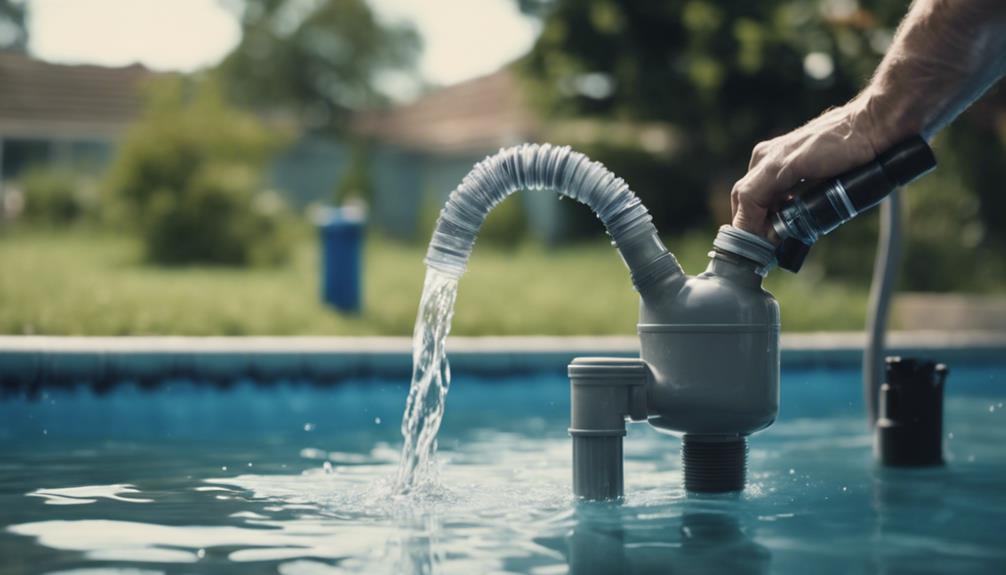
To promote sustainable water management and conservation efforts, it's essential to implement effective water recycling techniques in swimming pools.
Utilizing greywater systems, rainwater harvesting, backwash water recycling, natural filtration methods, and advanced water treatment technologies are key strategies that can greatly reduce water waste and enhance eco-friendly practices in maintaining pool water quality.
Recycling for Conservation
Consider incorporating water recycling techniques to reduce water consumption in swimming pools significantly. By recycling pool water, you can contribute to conservation efforts and minimize the environmental impact of traditional pool maintenance.
Implementing techniques like backwash water recycling and greywater reuse can effectively conserve resources and promote sustainable water management practices. Recycling pool water not only helps in keeping pools clean but also serves as an important and impactful option for homeowners looking to reduce their water consumption.
Sustainable Water Management
Using water recycling techniques in swimming pools can effectively reduce water wastage and promote sustainable water management practices. By implementing water recycling systems, you can greatly lower water consumption and contribute to environmental sustainability.
These practices not only help maintain pool water quality but also conserve resources by minimizing the need for frequent refilling. Water recycling methods in swimming pools play an essential role in reducing the environmental impact of pool maintenance, making it a cost-effective and eco-friendly choice.
By reusing swimming pool water through recycling techniques, you not only save on water usage but also actively promote water conservation and sustainable practices. Embracing sustainable water management through the adoption of water recycling techniques is a proactive step towards minimizing water wastage, preserving resources, and fostering a greener approach to pool maintenance.
Make a positive impact on both your wallet and the environment by incorporating these water-saving practices into your pool maintenance routine.
Frequently Asked Questions
How Can Pool Water Be Reused?
You can reuse pool water by repurposing it for irrigation, reducing strain on municipal water supplies.
This reclaimed water can also be treated for non-potable uses like car washing.
Recycling pool water conserves resources and lowers environmental impact.
Can I Put Old Pool Water on Plants?
You should avoid putting old pool water directly on plants due to its harmful effects on soil and vegetation. Untreated pool water, containing chlorine and other chemicals, can damage plants.
To safely reuse pool water for irrigation, it must be properly treated and filtered to remove harmful substances. Consult a professional or use specialized equipment to guarantee the water is safe for plants.
Prioritize the health of your plants by avoiding direct exposure to untreated pool water.
What Can I Do With Pool Waste Water?
When dealing with pool waste water, you have several eco-friendly options to contemplate.
Repurpose the water for irrigation to benefit plants and reduce water wastage.
Utilize it for cleaning tasks like washing vehicles or outdoor surfaces.
Explore filtering and purifying techniques for non-potable uses on your property.
You could also divert the waste water to replenish groundwater or recharge local water sources.
Always consult local regulations to confirm proper handling and disposal practices.
What Can I Do With Excess Pool Water?
When dealing with excess pool water, consider utilizing it for non-potable tasks like cleaning, flushing toilets, or watering plants. Proper filtration and treatment can render pool water safe for outdoor use, reducing strain on municipal water supplies.
What are Some Eco-Friendly Ways to Reuse Swimming Pool Water?
Looking for ecofriendly pool water recycling options? Consider using a filtration system to clean and reuse swimming pool water. Additionally, explore opportunities for repurposing pool water for watering plants or other non-potable uses. Implementing these strategies can help reduce water waste and promote sustainability.
Conclusion
To sum up, reusing swimming pool water isn't only a smart environmental choice but also a practical one. By implementing eco-friendly practices like treating and recycling pool water, you can reduce water waste, conserve resources, and contribute to a more sustainable future.
Just as a small ripple can create a wave of change, your efforts in reusing pool water can have a significant impact on preserving our planet for future generations.

